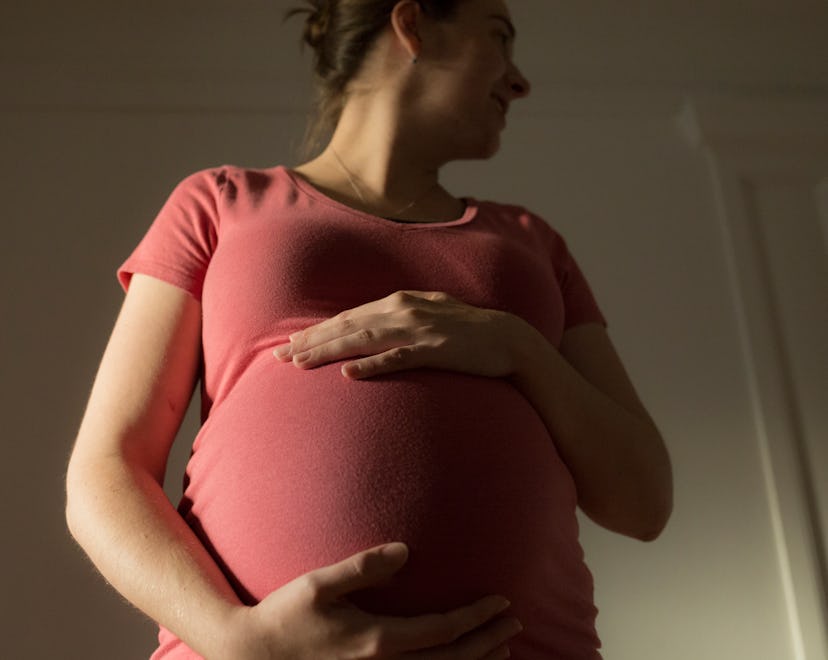Pregnancy

Can Being Scared Cause You To Go Into Labor?
Experts share what "scares" could potentially cause early contractions. (Hint: It's not the kind that come from a viewing of Halloween).
As a human, you likely fall into one of these two groups: Those who seek out haunted houses, ghost stories, and true-crime podcasts for thrills, and those who jump at the sound of kitten feet. Adults tend to either love feeling scared, or hate it. But what if you’re pregnant and relish all things spooky; should you be concerned about feeling so scared that it could potentially cause you to go into labor? While you might be fine to finish watching A Quiet Place Part II, doctors warn of other emotions and responses that could potentially lead to pre-term delivery.
Can Being Scared While Pregnant Cause Labor To Begin?
Fears aside, there’s still so much unknown surrounding the circumstances leading up to a person’s delivery, which The American College of Obstetricians and Gynecologists suggests is most like to occur after the 38th week of pregnancy. “Despite years of research, scientists don't quite know exactly how and when labor will start,” Dr. Ilina Pluym, OB-GYN and assistant professor in the division of Maternal Fetal Medicine at the David Geffen School of Medicine at UCLA, tells Romper. “We know it takes specific hormonal changes to start labor, but what triggers this hormonal response isn't clear.”
Indeed, oxytocin and prostaglandin hormones are involved in the kick-off to labor. But what if you’re home alone, for example, and you swear you heard footsteps coming down the stairs: Could that trigger a cascade of bodily reactions, potentially involving hormones, that could prompt contractions? “A fight-or-flight response with the release of catecholamines will actually slow down the release of oxytocin, which stimulates contractions,” says Pluym, who points out that this was an important response, evolutionarily, as it allowed for a woman to get to safety before birthing.
What Kind Of A Scare Could Potentially Impact Your Labor?
It’s important to understand the difference between scares and temporary freights, and serious stress. “There is evidence/consensus that chronic stress can contribute to early labor as can very significant stresses, such as the loss of a loved one or a pregnant mom’s medical illness,” Dr. Joel Greenya, D.O., a family physician at Mayo Clinic Health System in Prairie du Chien Wisconsin, tells Romper. “Stress from being scared is not quite the same response. I would be much less surprised to see contractions result in response to a stress response from feeling scared. Some of the main hormones contributing to labor are oxytocin, endorphins, and epinephrine. But just the amount of epinephrine — adrenaline — from a scare alone would be much less likely to trigger this complicated process.”
Here’s the thing: Dealing with prolonged periods of stress isn’t great for the body, pregnant or not. And Pluym tells Romper, “Long term chronic stress has been loosely associated with preterm contractions and delivery.”
Generally speaking, Pluym says, “Anything brief and short lived, like watching a scary movie is not a cause of concern. Prolonged periods of significant fear, anxiety, and the associated stress could potentially cause some pregnancy complications.” Greenya offers examples like having a trauma, illness, or if a person is grieving, as types of scares that would be “a different story.” So if you’re experiencing longer stretches of fear, or stress, consider reaching out to your caregivers to discuss.
Should You Avoid Getting Scared While Pregnant?
Go ahead, cue up your DVR, there’s a third installment of The Conjuring waiting. Says Greenya, “If you are the kind of person that, for whatever reason, enjoys a scary movie, you don’t need to avoid them in pregnancy. The idea that you shouldn’t watch scary movies in pregnancy doesn’t have any scientific evidence.” On the flip side, “If you are looking to watch a Halloween movie to trigger labor, unfortunately you’re probably out of luck.”
But what scares you, or keeps you up at night, might be totally different than what causes your bestie to lose sleep. So talk about your worries. “As always with medicine, the truth really is dependent on the individual patient and their situation. And I always encourage patients with any concerns to reach out to the provider that knows them and their situation best to ask any questions they may be concerned about,” says Greenya.
Sources:
Dr. Joel Greenya, D.O., a family physician at Mayo Clinic Health System in Prairie du Chien Wisconsin
Dr. Ilina Pluym, obstetrician-gynecologist and assistant professor in the division of Maternal Fetal Medicine at the David Geffen School of Medicine at UCLA
Studies referenced:
Chu, B., Marwaha, K., Sanvictores, T., Ayers, D. (2021) Physiology, Stress Reaction. StatPearls https://www.ncbi.nlm.nih.gov/books/NBK541120/